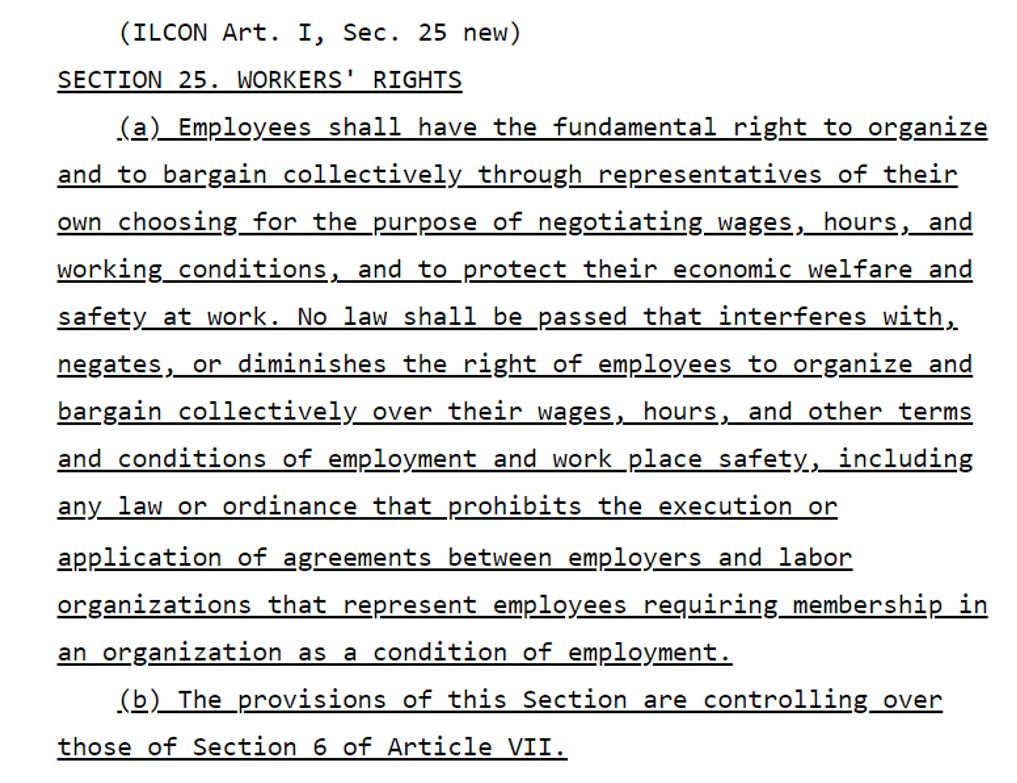Most Illinoisans will go to the voting booth this November thinking the Darren Bailey vs. J.B. Pritzker contest for governor is the only statewide race that really matters. But three other November 2022 votes matter a lot, too, a couple being arguably more consequential than the governor’s race.
First, there’s a referendum called Amendment 1 on the ballot that if approved, would enshrine Illinois’ union powers into the state constitution. The second vote will determine whether Republicans take control of the Supreme Court for the first time in decades. And the third, a vote for Attorney General, will have a major impact on the state’s approach to corruption and criminal justice.
1. The vote to enshrine union rights and powers into the Illinois Constitution
A proposition on the November ballot, called Amendment 1, would add a new constitutional amendment that would give unions a “fundamental right to organize and to bargain collectively” for matters that include workers’ “economic welfare.” Not only does the amendment create the new right, but it also prohibits any new law that “interferes with, negates, or diminishes the right of employees to organize and bargain collectively.”

The amendment has been marketed as a way to block any future attempt to pass private-sector Right-to-Work laws in Illinois, but its biggest impact would be to lock-in the state’s powerful collective bargaining rules for public sector unions in perpetuity.
The power to strike, to keep contract negotiations secret, to bargain over salaries, benefits, hours and more – all would effectively be enshrined in the constitution.
That’s why the fate of Amendment 1 is arguably more important than the governorship. If it passes, neither the governor nor the legislature will be able to pass labor reforms that reduce property taxes, restore parents’ rights in education or to reduce Illinois’ oppressive government footprint, regardless of who wins in November 2022.
2. The vote for two Supreme Court seats
Two of the seven seats on the Illinois Supreme Court are being contested this November and for the first time in decades, a Republican-controlled court is a possibility. The outcome is potentially bigger than the governorship given the 10-year terms of the justices and the possibility for new, precedent-setting court rulings.
The potential shakeup is the result of the state’s recent court redistricting, as well as the failure of Democrat Supreme Court Justice Thomas Killbride to retain his seat. Democrats currently hold the three justice positions tied to Chicago as well the one in the state’s third district.
The Second District has Republican Mark Curran running against Democrat Elizabeth Rochford and the Third District has Republican Michael Burke against Democrat Mary Kay O’Brien this November.
The potential change in the court matters given the state’s need for pension and retiree health insurance reform as well as the potential of abortion, criminal justice, election and environmental/energy cases that will likely crop up over the next several years.
Crime, in particular, will be important as the court will have to rule on the details of the SAFE-T Act – especially considering the act’s elimination of cash bail and the need to determine the criteria for detaining accused violent criminals.
3. The vote for Attorney General.
The vote for Attorney General will directly impact the fight against state political corruption and crime. Incumbent Kwame Raoul is running against attorney Tom DeVore, who has garnered attention in recent years for his challenges against Gov. Pritzker’s Covid mandates.
For decades, the office of the Attorney General has done little to fight corruption in Illinois. Instead, most corruption allegations and indictments have come the way of federal prosecutors. The prosecution of Ald. Ed Burke, House Speaker Mike Madigan, Gov. Blagojevich – and a host of recent Chicago aldermen and state lawmakers – all were the result of federal efforts.
In contrast, there are no notable examples of the state AG prioritizing corruption. The most recent example of inaction is lack of concern regarding the Jenny Thornley affair.
General crime is another issue. When local prosecutors like Cook County State’s Attorney Kim Foxx won’t charge suspects, there is the potential for the state AG to step in and pursue charges. That, of course, would require changes in state law, but given the jump in Illinois crime, expect a push in that direction.
